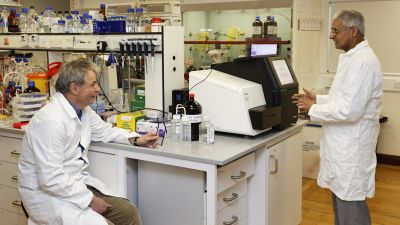Cambridge scientists awarded top science prize

Two British scientists have won a top prize for DNA sequencing technology they developed as a "happy accident" that has gone on to help identify coronavirus variants.
Cambridge University chemists Sir Shankar Balasubramanian and Sir David Klenerman were awarded the 2020 Millennium Technology Prize, by Technology Academy Finland (TAF).
The duo co-invented the Solexa-Illumina Next Generation DNA Sequencing (NGS), technology that has enhanced the basic understanding of life, converting biosciences into big science by enabling fast, accurate, low-cost and large-scale genome sequencing. This is the process of determining the complete DNA sequence of an organism's make-up.
The scientists then co-founded the company Solexa to make the technology more broadly available to the world. Their technology has allowed what they say is million-fold improvement in speed and cost when compared to the first sequencing of the human genome.
In 2000, sequencing of one human genome took more than 10 years and cost more than one billion US dollars.
Today, because of the technology invented by the two scientists, it can be sequenced in one day at a cost of 1,000 US dollars and more than a million human genomes are sequenced at scale each year.
This means diseases can be understood much better and much more quickly.Sir Shankar said:
"We were not trying to develop a way to sequence DNA, we were actually exploring basic science, and we were funded to do basic science research, and along that journey it just so happened we saw the opportunity and took it."
He added: " I think a happy accident - I think a lot of things in science come from exploration."
Next generation sequencing provides an effective way to study and identify new coronavirus strains and other pathogens. With the emergence of the pandemic, the technology is now being used to track and explore viral mutations.
The results will also be used to prevent future pandemics. NGS is also helping scientists and researchers to identify the underlying factors in individuals that contribute to their immune response to Covid-19.
The award's international selection committee - the body of experts that evaluates all nominations for the prize - made its decision in February 2020, before the Covid-19 pandemic. Because of its efficiency, NGS is now being widely adopted in healthcare anddiagnostics, such as cancer, rare diseases, infectious medicine, and sequencing-based non-invasive prenatal testing.
Asked about the award, Sir David said: "We didn't do it, to be recognised.
Both scientists said the award was not just for them, but for the whole team that played a key role in the development of the technology.
Academy Professor Paivi Torma, chairwoman of the Millennium Technology Prize Selection Committee, said: "The future potential of NGS is enormous and the exploitation of the technology is still in its infancy.
"The technology will be a crucial element in promoting sustainable developmentthrough personalisation of medicine, understanding and fighting killer diseases,and hence improving the quality of life. Professor Balasubramanian and ProfessorKlenerman are worthy winners of the prize."
The global prize, awarded at two-year intervals since 2004 to highlight the extensive impact of science and innovation on the wellbeing of society, is worth one million euros.